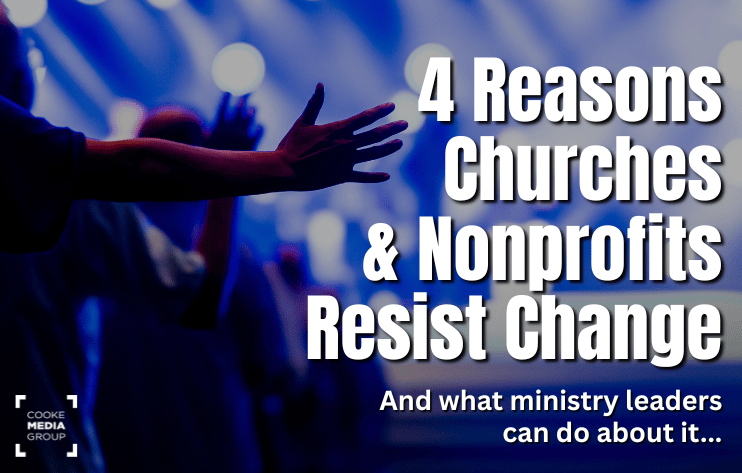Change is hard. Changing a church, ministry, or nonprofit organization is even harder – sometimes, nearly impossible. Yet in today’s disruptive world, responding well to change is critical for ministry leaders and nonprofit organizations to succeed. Jesus chastised the religious leaders of his day because they couldn’t read the signs of the times. Today those signs seem to be rushing faster than ever.
As you struggle with your leadership team, employees, donors, or congregation members to shift their thinking – it’s good to understand why people resist change. Figure out which of these applies to your nonprofit or ministry organization, and how to overcome it, and you’ll be well on your way to seeing transformation.
Here are key reasons why people resist change:
1. Self-Interest
Change feels like an unfair imposition on their territory. Silos and walls happen even in nonprofit organizations, and people want to control their turf and feel like they have a say in their future. We human beings are territorial and want some sense of power.
2. Misunderstanding or Lack of Trust
What people don’t understand, they will resist. Just because you see why your church needs to change doesn’t mean others will. Realize that as a ministry leader, you have knowledge that staff, volunteers or congregants don’t have, so make sure you’re helping them understand all the issues and options.
3. Differing Ways of Assessing Things
People have opinions and may see the cost as greater than the benefits. As a ministry leader, you might not think much about where the coffee break room is. But for an administrative assistant or support team, it could be very important. Different issues and policies mean different things to different people in nonprofit and ministry organizations.
_________________________________________________________________________________
BRING IN THE EXPERTS
If people are resisting change in your nonprofit or ministry organizations, I’ve found that sometimes it helps to bring in outside experts. Our team can help your team grasp the importance of change and help you practically move towards it. Contact us to schedule an on-site strategy meeting or workshop to help you implement change.
_________________________________________________________________________________
4. People Lack Confidence in the Decision-Making Process
Sometimes, they don’t believe all the relevant information has been included in the process, or they don’t trust the person implementing the change. If your team or congregation is not confident that the cost is worth it, they’ll fight against it. The key here is to ensure they’re aware of or involved in the process.
Knowing WHY they’re fighting change is half the battle. Years ago, I consulted with a media ministry that hated change so much that they had department-wide meetings about how to get rid of me. This was despite the fact that my changes brought in record fundraising, higher salaries, better equipment, and even the removal of their dress code.
Most people struggle with change, so figure out where they’re uncomfortable. When that happens, you can focus on what matters – becoming the church, ministry, or nonprofit organization you were meant to be.
CHANGE IS HARD.
You don’t have to navigate the waters alone. Contact our team of experts to consult and guide your church or nonprofit organization into your future. Reach out here.
This article first appeared on PhilCooke.com. For more leadership blogs and resources, sign up here.
_________________________________________________________________________________
Phil Cooke, PhD., has been called “one of the most innovative communicators of our generation.” As the CEO/founder of Cooke Media Group, media producer, writer, speaker, and consultant, his client list includes major film studios and TV networks as well as major Christian organizations like Voice of the Martyrs, The Museum of the Bible, The Salvation Army, and others. He’s also coached and consulted with many of the most influential churches and nonprofit organizations in the world, helping them use media to tell their story. Access his podcasts on creative leadership here.

